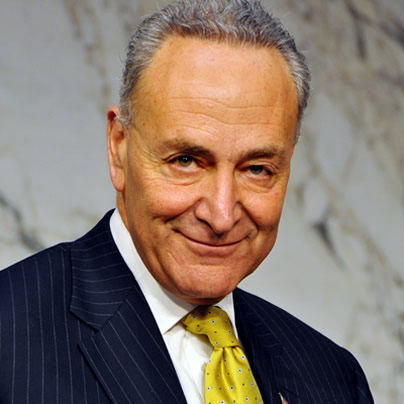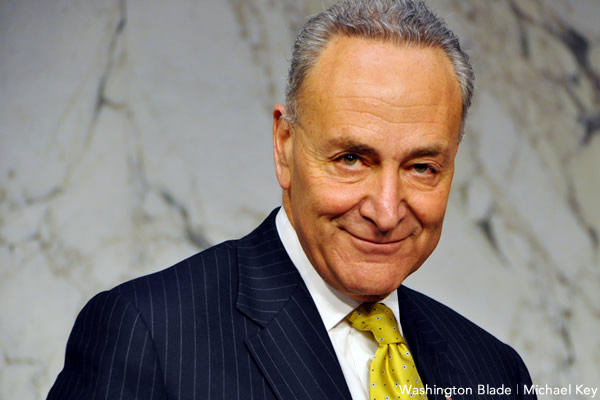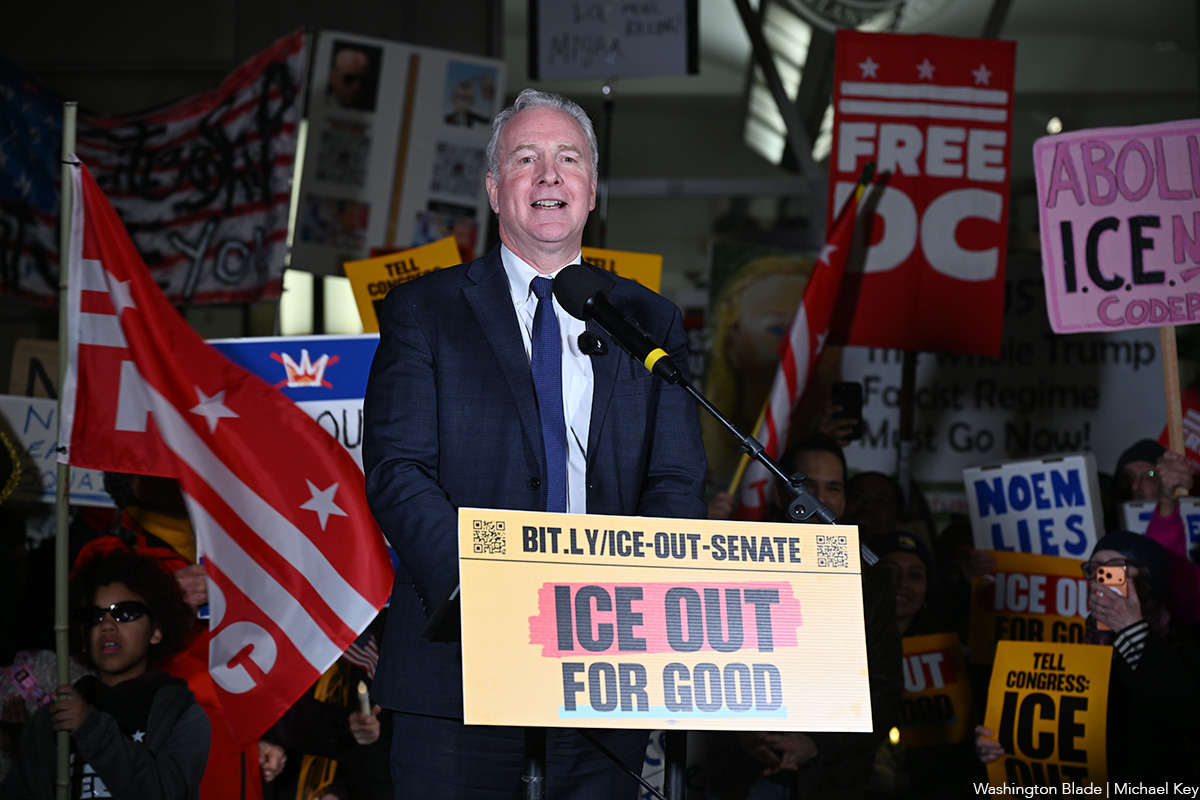Politics
Could UAFA pass as a floor amendment to immigration reform?
LGBT groups support bill despite exclusion of bi-national gay couples


Sen. Chuck Schumer (D-N.Y.) has raised the possibility of UAFA as a floor amendment. (Washington Blade photo by Michael Key)
In the wake of a Senate committee decision to exclude bi-national gay couples from immigration reform, LGBT rights supporters are turning to a possible floor amendment as a way to salvage inclusion in the bill.
LGBT groups working on the issue — Immigration Equality and the Human Rights Campaign — told the Washington Blade they’ve asked Senate Judiciary Committee Chair Patrick Leahy (D-Vt.) to offer the language as an amendment when it comes before the full Senate as expected this month.
Steve Ralls, a spokesperson for Immigration Equality, said discussions are underway to push for a floor amendment along the lines of UAFA, which would enable gay Americans to sponsor their foreign partners for residency in the United States, but a lot depends on the case before the Supreme Court challenging the Defense of Marriage Act.
“I can tell you if the immigration bill is moving toward a vote before we have a Supreme Court DOMA ruling — or after we have a bad Supreme Court ruling — a floor option is something we very much want to look at,” Ralls said. “We’re kind of in two competing timelines here; it’s not entirely clear how quickly the immigration bill will move forward for a vote, and we don’t know exactly when we’re going to have a Supreme Court ruling.”
Bombarded by accusations on his Facebook page that he betrayed the LGBT community by asking the Senate Judiciary Committee to hold off on the amendment, Sen. Chuck Schumer (D-N.Y.) in response raised the possibility of a floor amendment.
“I’ve been a lead sponsor of the Uniting American Families Act for a number of years and I believe and desire that its principles should be included in the immigration bill,” Schumer writes. “There will be an opportunity to add it to the bill on the Senate floor.”
But none of the groups involved say they’ve received commitments from Leahy that he’ll introduce the amendment on the Senate floor, nor has the Vermont senator publicly committed to offering the amendment.
Jessica Brady, a Senate Judiciary Committee spokesperson, said she doesn’t have anything to offer in terms of public commitment for offering UAFA as an amendment on the floor.
“I’m going to have to refer you back to Sen. Leahy’s comments in the markup, when he said he would continue to fight to take discrimination out of the law,” Brady said. “He didn’t specify if he would offer an amendment on the floor.”
Moreover, finding the 60 votes on the Senate floor to end a filibuster on UAFA is significantly more difficult than obtaining the simple majority needed for passage in committee.
Assuming all 54 members of the Democratic caucus support UAFA — and the votes from Sens. Mark Pryor (D-Ark.), Mark Landrieu (D-La.) and Joe Manchin (D-W.Va.), who don’t support marriage equality, are in question — five Republicans would need to vote “yes” in addition to Sen. Susan Collins (R-Maine), the only GOP co-sponsor. The Democrats are now short one vote following the death of Sen. Frank Lautenberg (D-N.J.).
Ralls said finding the necessary 60 votes to end a filibuster on the Senate floor will be “tough,” but he expects Schumer and other Democrats in committee who couldn’t bring themselves to vote for amendments out of fear of losing Republican support for immigration reform to find support for a measure for bi-national couples on the floor.
“I think all of the Democrats on that committee who told Sen. Leahy not to offer the amendment last week owe to our families and they owe it to Sen. Leahy to find the path to 60 votes if we need them to get us there,” Ralls said.
The White House has talked about the possibility of UAFA as a floor amendment to immigration reform once it reaches the Senate floor. Under questioning from the Washington Blade on Friday, White House Principal Deputy Press Secretary Josh Earnest said he thinks “there is an amendment process on the Senate floor where this could be considered, so I don’t want to predict the outcome at this point.”
On NBC’s “Meet the Press,” Schumer said he expects the immigration bill to see action soon on the Senate floor — meaning the question of whether UAFA will be introduced as a floor amendment will have to be answered soon.
“We’re going to put immigration on the floor starting on June 10. I predict it will pass the Senate by July 4,” Schumer said. “We’re hoping to get 70 votes — up to 70 votes, which means a lot of Republicans.”
LGBT groups continue to back reform
Even without the provision for gay couples, LGBT groups are continuing to say they support the measure because it contains other provisions that would directly impact the LGBT community and provide a path to citizenship for the estimated 267,000 LGBT people who are among the 11 million undocumented immigrants in the country.
Among the provisions that directly impact the LGBT community is repeal of the one-year deadline on filing for asylum — a deadline that many LGBT asylum seekers in the United States miss because they’re unaware of it or lack the financial resource to meet it — and improvements in immigration detention facilities to benefit transgender detainees.
In a conference call with reporters, the National Center for Lesbian Rights, GLAAD and GetEQUAL highlighted these aspects of immigration reform to bolster its support among LGBT people.
Kate Kendell, executive director of the National Center for Lesbian Rights, was among those who said the provisions related to asylum and detentions facilities are important to the work done by LGBT advocates.
“We also recognized early that the bill will impact many more LGBT people than simply would be impacted by UAFA,” Kendell said. “We have seen some of the most horrific stories of damage done, discrimination, harassment, terrorizing [involving] LGBT asylum seekers and detention facilities in this country.”
Ralls acknowledged that Immigration Equality continues to support the immigration bill despite discontent over the lack of UAFA-like language in the legislation.
“We’re very disappointed that the bill does not currently include binational families, but as the LGBT organization that speaks to more immigrants than every other group in our community combined, we support the bill, as it includes important provisions that would help many of those individuals, many of whom are our clients, too,” Ralls said.
Fred Sainz, HRC’s vice president of communications, also said his organization still supports immigration reform even without language for bi-national gay couples.
“We are committed to immigration reform,” Sainz said. “Undocumented individuals that happen to be LGBT will immeasurably benefit from immigration reform.”
Meanwhile, the Republican-controlled House has its own “Gang of Eight” working on its version of reform, although the legislation that group of lawmakers produces, as Ralls noted, isn’t expected to include a provision for bi-national gay couples.
“Our strategy all along has been we want to be in the Senate bill, that if a Senate and House bill go to conference, we can rely on our champions in both chambers to make sure that we stay in the bill that reaches the president’s desk,” Ralls said.
Rep. Jerrold Nadler (D-N.Y.), sponsor of UAFA in the House, would likely be the one to amend the bill to include the provision, but given the conservative nature of the House, amending the bill in either committee or the floor to include UAFA seems unlikely.
Ilan Kayatsky, a Nadler spokesperson, said plans for what will happen with the House bill after it’s unveiled by the House “Gang of Eight” are unclear.
“We still don’t know what form or process the House CIR bill will take, so it’s premature to sort out the UAFA specifics just now,” Kayatsky said.
What happens if the Supreme Court strikes down DOMA?
The best hope for bi-national couples may be a ruling from the U.S. Supreme Court on pending litigation challenging DOMA, the federal law prohibiting federal recognition of same-sex marriage. The Obama administration has consistently cited this law, and only this law, as the reason why married bi-national gay couples are ineligible for a visa through the marriage-based green card application process.
Moreover, UAFA would no longer be operable for these legally married couples if DOMA were struck down. Even though UAFA provides a path to residency for “permanent partners,” it would no longer provide relief for couples in these states because the law, under Section 2, subsection D, only applies to those who are “unable to contract with that other individual a marriage cognizable under this Act.”
But the situation is murkier for bi-national couples who live in states without marriage equality. Will someone living in Texas be able to sponsor someone as a “permanent partner” or will they have to travel to a marriage equality state, wed, and then apply for a green card through a marriage-based green card application process? What if they cannot leave the state out of financial constraints?
Ralls said the way Immigration Equality interprets UAFA, the law would still have some use in non-marriage equality states even if DOMA is struck down.
“In some ways, it would make it simpler for couples in non-married states, they would not have to travel, they would be able to apply from their home state for their green card,” Ralls said. “So, in some ways, it’s broader and it applies to couples in all 50 states without forcing them to travel.”
Jon Davidson, legal director for Lambda Legal, said he can’t say at this point under what circumstances a bi-national same-sex couple in a non-marriage equality state would be eligible to apply for a visa if UAFA were law and DOMA were struck down.
“I don’t believe there is a definition of that term in the bill and the focus has been on creating relief from DOMA, not the range of reasons that might make it impossible to travel to a state where same-sex couples can marry,” Davidson said. “Indeed, if the bill were to pass, a court might interpret ‘unable to contract’ to reference legal inability not practical inability in light of one’s personal circumstances.”
But even with the possibility of a Supreme Court ruling against DOMA that would allow at least married bi-national couples to stay in the United States, Ralls said it’s incumbent upon Congress to act.
“We think DOMA is unconstitutional, and we hope the court agrees,” Ralls said. “But when it comes to advocating for real families who are impacted by this, we’re not willing to put all of our eggs in a basket that hasn’t yet been delivered. I do not want to have to tell our couples, the day after a bad DOMA ruling, ‘I wish we had fought harder in Congress.'”
Congress
McBride, other US lawmakers travel to Denmark
Trump’s demand for Greenland’s annexation overshadowed trip

Delaware Congresswoman Sarah McBride is among the 11 members of Congress who traveled to Denmark over the past weekend amid President Donald Trump’s continued calls for the U.S. to take control of Greenland.
McBride, the first openly transgender person elected to Congress, traveled to Copenhagen, the Danish capital, with U.S. Sens. Chris Coons (D-Del.), Thom Tillis (R-N.C.), Jeanne Shaheen (D-N.H.), Dick Durbin (D-Ill.), and Lisa Murkowski (R-Alaska) and U.S. Reps. Steny Hoyer (D-Md.), Gregory Meeks (D-N.Y.), Madeleine Dean (D-Pa.), Don Bacon (R-Neb.), and Sarah Jacobs (D-Calif.). The lawmakers met with Danish Prime Minister Mette Frederiksen and Greenlandic MP Pipaluk Lynge, among others.
“I’m grateful to Sen. Coons for his leadership in bringing together a bipartisan, bicameral delegation to reaffirm our support in Congress for our NATO ally, Denmark,” said McBride in a press release that detailed the trip. “Delaware understands that our security and prosperity depend on strong partnerships rooted in mutual respect, sovereignty, and self-determination. At a time of growing global instability, this trip could not be more poignant.”
Greenland is a self-governing territory of Denmark with a population of less than 60,000 people. Trump maintains the U.S. needs to control the mineral-rich island in the Arctic Ocean between Europe and North America because of national security.
The Associated Press notes thousands of people on Saturday in Nuuk, the Greenlandic capital, protested against Trump. British Prime Minister Keir Starmer is among those who have criticized Trump over his suggestion the U.S. would impose tariffs against countries that do not support U.S. annexation of Greenland.
A poll that Sermitsiaq, a Greenlandic newspaper, and Berlingske, a Danish newspaper, commissioned last January indicates 85 percent do not want Greenland to become part of the U.S. The pro-independence Demokraatit party won parliamentary elections that took place on March 12, 2025.
“At this critical juncture for our countries, our message was clear as members of Congress: we value the U.S.-Denmark partnership, the NATO alliance, and the right of Greenlanders to self-determination,” said McBride on Sunday in a Facebook post that contained pictures of her and her fellow lawmakers meeting with their Danish and Greenlandic counterparts.
Congress
Van Hollen speaks at ‘ICE Out for Good’ protest in D.C.
ICE agent killed Renee Nicole Good in Minneapolis on Jan. 7

U.S. Sen. Chris Van Hollen (D-Md.) is among those who spoke at an “ICE Out for Good” protest that took place outside U.S. Customs and Border Protection’s headquarters in D.C. on Tuesday.
The protest took place six days after a U.S. Immigration and Customs Enforcement agent shot and killed Renee Nicole Good, a 37-year-old woman in Minneapolis.
Good left behind her wife and three children.
(Video by Michael K. Lavers)
Congress
Advocates say MTG bill threatens trans youth, families, and doctors
The “Protect Children’s Innocence” Act passed in the House

Georgia Congresswoman Marjorie Taylor Greene has a long history of targeting the transgender community as part of her political agenda. Now, after announcing her resignation from the U.S. House of Representatives, attempting to take away trans rights may be the last thing she does in her official capacity.
The proposed legislation, dubbed “Protect Children’s Innocence Act” is among the most extreme anti-trans measures to move through Congress. It would put doctors in jail for up to 10 years if they provide gender-affirming care to minors — including prescribing hormone replacement therapy to adolescents or puberty blockers to younger children. The bill also aims to halt gender-affirming surgeries for minors, though those procedures are rare.
Greene herself described the bill on X, saying if passed, “it would make it a Class C felony to trans a child under 18.”
According to KFF, a nonpartisan source for health policy research, polling, and journalism, 27 states have enacted policies limiting youth access to gender-affirming care. Roughly half of all trans youth ages 13–17 live in a state with such restrictions, and 24 states impose professional or legal penalties on health care practitioners who provide that care.
Greene has repeatedly introduced the bill since 2021, the year she entered Congress, but it failed to advance. Now, in exchange for her support for the National Defense Authorization Act, the legislation reached the House floor for the first time.
According to the 19th, U.S. Rep. Sarah McBride (D-Del.), the first trans member of Congress, rebuked Republicans on the Capitol steps Wednesday for advancing anti-trans legislation while allowing Affordable Care Act tax credits to expire — a move expected to raise health care costs for millions of Americans.
“They would rather have us focus in and debate a misunderstood and vulnerable one percent of the population, instead of focusing in on the fact that they are raiding everyone’s health care,” McBride said. “They are obsessed with trans people … they are consumed with this.”
Polling suggests the public largely opposes criminalizing gender-affirming care.
A recent survey by the Human Rights Campaign and Global Strategy Group found that 73 percent of voters in U.S. House battleground districts oppose laws that would jail doctors or parents for providing transition-related care. Additionally, 77 percent oppose forcing trans people off medically recommended medication. Nearly seven in 10 Americans said politicians are not informed enough to make decisions about medical care for trans youth.
The bill passed the House and now heads to the U.S. Senate for further consideration.
According to reporting by Erin Reed of Erin In The Morning, three Democrats — U.S. Reps. Henry Cuellar and Vicente Gonzalez of Texas and Don Davis of North Carolina — crossed party lines to vote in favor of the felony ban, joining 213 Republicans. A total of 207 Democrats voted against the bill, while three lawmakers from both parties abstained.
Advocates and lawmakers warned the bill is dangerous and unprecedented during a multi-organizational press call Tuesday. Leaders from the Human Rights Campaign and the Trevor Project joined U.S. Rep. Becca Balint (D-Vt.), Dr. Kenneth Haller, and parents of trans youth to discuss the potential impact of restrictive policies like Greene’s — particularly in contrast to President Donald Trump’s leniency toward certain criminals, with more than 1,500 pardons issued this year.
“Our MAGA GOP government has pardoned drug traffickers. They’ve pardoned people who tried to overthrow the government on January 6, but now they want to put pediatricians and parents into a jail cell for caring for their kids,” said Human Rights Campaign President Kelley Robinson. “No one asked for Marjorie Taylor Greene or Dan Crenshaw or any politician to be in their doctor’s office, and they should mind their own business.”
Balint, co-chair of the Congressional Equality Caucus, questioned why medical decisions are being made by lawmakers with no clinical expertise.
“Parents and doctors already have to worry about state laws banning care for their kids, and this bill would introduce the risk of federal criminal prosecution,” Balint said. “We’re talking about jail time. We’re talking about locking people up for basic medical care, care that is evidence-based, age-appropriate and life-saving.”
“These are decisions that should be made by doctors and parents and those kids that need this gender-affirming care, not certainly by Marjorie Taylor Greene.”
Haller, an emeritus professor of pediatrics at St. Louis University School of Medicine, described the legislation as rooted in ideology rather than medicine.
“It is not science, it is just blind ideology,” Haller said.
“The doctor tells you that as parents, as well as the doctor themselves, could be convicted of a felony and be sentenced up to 10 years in prison just for pursuing a course of action that will give your child their only chance for a happy and healthy future,” he added. “It is not in the state’s best interests, and certainly not in the interests of us, the citizens of this country, to interfere with medical decisions that people make about their own bodies and their own lives.”
Haller’s sentiment is echoed by doctors across the country.
The American Medical Association, the nation’s largest organization that represents doctors across the country in various parts of medicine has a longstanding support for gender-affirming care.
“The AMA supports public and private health insurance coverage for treatment of gender dysphoria and opposes the denial of health insurance based on sexual orientation or gender identity,” their website reads.
Rodrigo Heng-Lehtinen, senior vice president of public engagement campaigns at the Trevor Project, agreed.
“In Marjorie Taylor Greene’s bill [it] even goes so far as to criminalize and throw a parent in jail for this,” Heng-Lehtinen said. “Medical decisions should be between patients, families, and their doctors.”
Rachel Gonzalez, a parent of a transgender teen and LGBTQ advocate, said the bill would harm families trying to act in their children’s best interests.
“No politician should be in any doctor’s office or in our living room making private health care decisions — especially not Marjorie Taylor Greene,” Gonzalez said. “My daughter and no trans youth should ever be used as a political pawn.”
Other LGBTQ rights activists also condemned the legislation.
Tyler Hack, executive director of the Christopher Street Project, called the bill “an abominable attack on the transgender community.”
“Marjorie Taylor Greene’s last-ditch effort to bring her 3-times failed bill to a vote is an abominable attack on the transgender community and further cements a Congressional career defined by hate and bigotry,” they said. “We are counting down the days until she’s off Capitol Hill — but as the bill goes to the floor this week, our leaders must stand up one last time to her BS and protect the safety of queer kids and medical providers. Full stop.”
Hack added that “healthcare is a right, not a privilege” in the U.S., and this attack on trans healthcare is an attack on queer rights altogether.
“Marjorie Taylor Greene has no place in deciding what care is necessary,” Hack added. “This is another attempt to legislate trans and queer people out of existence while peddling an agenda rooted in pseudoscience and extremism.”
U.S. Rep. Mark Takano (D-Calif.), chair of the Congressional Equality Caucus, also denounced the legislation.
“This bill is the most extreme anti-transgender legislation to ever pass through the House of Representatives and a direct attack on the rights of parents to work with their children and their doctors to provide them with the medical care they need,” Takano said. “This bill is beyond cruel and its passage will forever be a stain on the institution of the United States Congress.”
The bill is unlikely to advance in the Senate, where it would need 60 votes to pass.



















